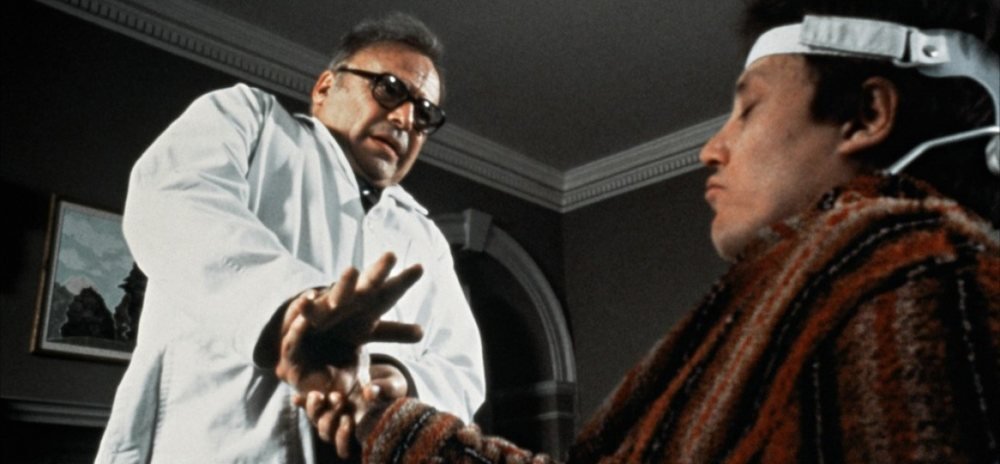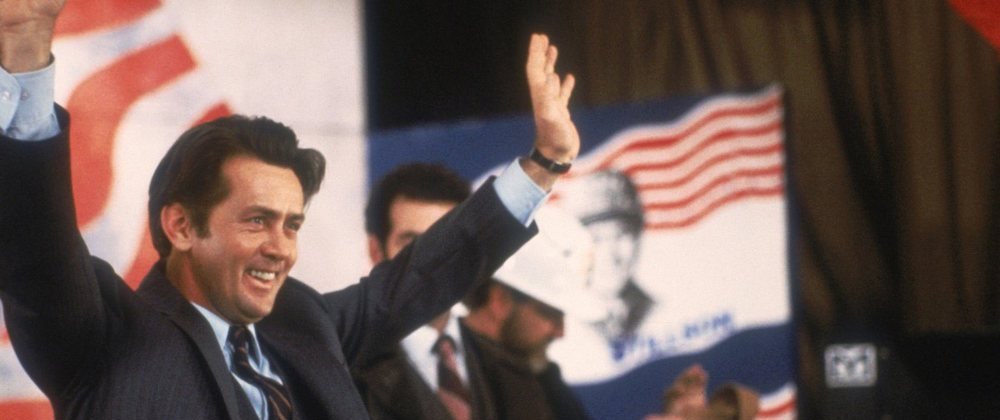THE DEAD ZONE (1983): Still The King Of King Adaptations
Adaptations of Stephen King novels have always been adicey proposition for horror fans. Hisoften-cinematic premises seem tailor-made for silver screen success in theorybut many of them lose something in the translation from page to movingimage. Thus, for every class act like Carrie you get at least two duds like Firestarter. Even when King himself does the adapting, theviewer risks being subjected to something horribly misguided like Maximum Overdrive.
The reason for this erratic track record is simple: it’svery difficult to boil down King’s combination of genre-savvy concepts,well-observed regional details and his knack for finding the emotional heart indark story concepts. However, theadaptations that succeed are not only worthwhile but also provide a greatreminder why King is such a popular, culturally resonant writer. The Dead Zone may very well be the bestof the bunch.

For one thing, it’s one of the most serious and leastgimmicky of King’s horror efforts. Thestory focuses on Johnny Smith (Christopher Walken), a small-town schoolteacherwho slips into a five-year coma after a car accident. When he awakens, he discovers that he is nowa man out of time and place. The rest ofthe world has moved on, including Sarah (Brooke Adams), the woman he intendedto marry.
Johnny’s situation becomes more complex when hediscovers he has the ability to see events in someone’s past or future bytouching them. He tries to use theability for good – even managing to help Sheriff Bannerman (Tom Skerritt) findthe ‘Castle Rock Killer’ – but the ability takes a physical and psychologicaltoll on him. He tries to go intoseclusion but his gift won’t allow it... and the ultimate dilemma revealsitself when an accidental handshake with aspiring politician Greg Stillson(Martin Sheen) prompts a highly disturbing vision of possible future events.
TheDead Zone earned much praise for King as a novel because it isone of his most understated efforts, a book subtle enough to allow the readerto concentrate on his gifts as a storyteller. Thankfully, the film takes a similar approach. Jeffrey Boam’s thoughtful adaptation of thenovel succeeds in paring down its expansive narrative to the key events whilemanaging to keep the regional flavor and rich characterizations. As a result, the script has a lot ofsubstance but never becomes bogged down in its storyline.

Even better, director David Cronenberg handles the storywith a delicacy and subtlety one wouldn’t expect from the man who gave us Rabid and Videodrome. He applies avisceral touch where needed – mainly during the inventive sequences that placeJohnny ‘in’ his visions as he sees them occur in his mind – but he otherwiseallows the story and characters to carry the day while creating a wintry,pensive mood that gives this thoughtful tale a perfect visual/emotionalbackdrop. His work is aided tremendouslyby lovely cinematography by Mark Irwin, precise editing from Ronald Sanders anda richly-hued orchestral score from Michael Kamen. Equally worthy of note is Carol Spier’sproduction design, which creates a convincing ‘Americana’ backdrop withoutoverdoing any of the details.
However, the most important element of The Dead Zone is the quality of itsperformances: King-penned horror tales hinge upon their ability to emotionallyinvest the reader so strong, natural performances are a must to make anadaptation of one of his novels succeed. Luckily, The Dead Zonebenefits from strong work across the board by a gifted ensemble of actors. Cronenberg wisely eschewed the use ofbig-name stars in favor of judiciously selected character actors and thisstrategy results in a gallery of memorable supporting turns: for instance, Herbert Lom is quietly movingas a doctor who tries to help Johnny and Brooke Adams is warm and believablyconflicted as his true love. Elsewhere,Tom Skerritt does some sympathetic work as the sheriff who has to coerce Johnnyinto helping him find a killer and Anthony Zerbe is convincing as a rich,well-meaning employer of Johnny’s whose pushiness becomes his downfall.

That said, there are two performances that dominate anddrive the film. First is ChristopherWalken’s impressive turn as Johnny. Though he would later become famous for showy work in character parts,Walken makes an excellent dramatic lead here. His natural intensity and odd vocal intonations serve him well as hecreates a decent, intelligent man struggling to deal with theunimaginable. He never overplays andalso shows a surprising vulnerability that is likely to win many viewersover. Walken’s work is matched by afeverish performance from Martin Sheen as Stillson. It’s the one role in the film that demands ashowy performance and Sheen gives it all he’s got, creating a character whosegood ‘ol boy demeanor just barely conceals the sociopath inside.
In short, The Dead Zone has aged gracefully and remains one of the (if not the) benchmark examples of a great Stephen King adaptation.


